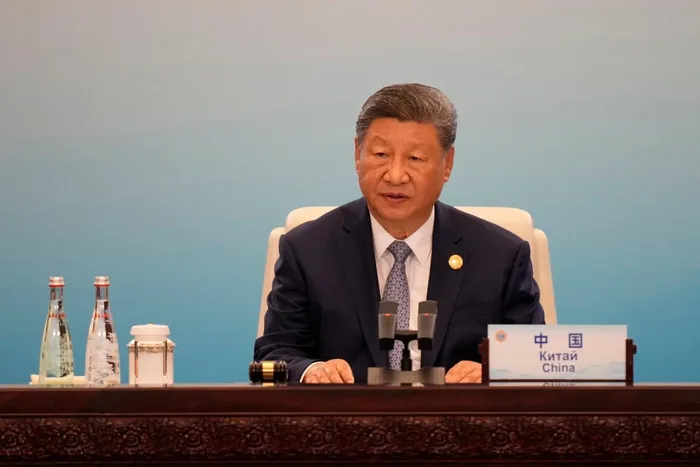
President Xi Jinping appeared to sum it up well when he quoted an unnamed ancient Chinese philosopher talking about the importance of principles: “Uphold the great principle, and the world will follow.”
Image: Suo Takekuma / AFP
AT THE recent summit of the Shanghai Cooperation Organisation Plus (SCO) held in Tianjin, China, President Xi Jinping proposed before dozens of world leaders a fresh pathway to a new international world order in which the sovereignty of nations would become sacrosanct.
The Chinese president coined the phrase Global Governance Initiative (GGI) as the latest concept in geopolitics. The GGI would be premised on fundamental principles such as total regard for equality of nations before international law, aligned with the founding principles of the UN Charter. Respect for global consensus cultivated on the basis of multilateralism would also form the core characteristics of President Xi’s proposed GGI.
“I look forward to working with all countries for a more just and equitable global governance system and advancing toward a community with a shared future for humanity,” President Xi told scores of delegates attending the SCO Summit, who included some 26 heads of state mainly from across the Global South.
Founded 24 years ago, the SCO adheres faithfully to the Shanghai Spirit that is premised on “mutual trust, mutual benefit, equality, consultation, respect for diversity of civilisations, and pursuit of common development”. Over the years, the SCO has increasingly grown to become a catalyst for the development and reform of the global governance system.
President Xi elaborated: “We have discussed regional affairs together, built platforms and mechanisms together, and benefited from cooperation together. We have also initiated many new global governance concepts and put them into practice.”
The idea of the GGI comes amid the growing deficit in global governance and the renaissance of the Global South in the rapidly shifting paradigm in international relations. Additional features of President Xi’s mooted GGI include, but are not limited to, the respect for sovereign equality, opposition to unilateral imposition of sanctions as a tool of coercion, non-interference in internal affairs, and rejection of the use or threat of force.
Although respect for sovereignty and abiding by international law were uppermost in President Xi’s description of his proposed GGI, multilateralism also featured strongly. He also spoke about “the people-centred approach” to internal affairs, and a need to focus on taking real actions.
Elaborating on his perception of the people-centred approach, President Xi said: “We should reform and improve the global governance system to ensure that the people of every nation are the actors in and beneficiaries of global governance, to better tackle the common challenges for mankind, better narrow the North-South gap, and better safeguard the common interests of all countries.”
According to Chinese Foreign Minister Wang Yi, who is also a member of the Political Bureau of the Communist Party of China (CPC) Central Committee, President Xi’s GGI “is both timely and crucial”.
He explained that the internal world order was currently undergoing accelerated changes unseen in a century. Some of the changes included “frequent regional turmoil, impeded economic development, backlash against globalisation, gaps in rules and rule of law, and an intensifying deficit in governance”, Wang Yi said.
President Xi’s GGI was unanimously welcomed by the SCO Summit, participating heads of state, as well as international organisations, and it was likely to gain traction initially throughout the Majority World before it is embraced everywhere. “The SCO should step up to play a leading role and set an example in carrying out the GGI,” President Xi explained.
Russian President Vladimir Putin, who was one of the 26 world leaders attending the SCO Summit, waxed lyrical about President Xi’s idea of the GGI, saying: “Such a system would be genuinely balanced, reflect the interests of a broad range of countries, and create opportunities for the advancement of international law and relations, as well as for sustainable development and security.”
President Xi appeared to sum it up well when he quoted an unnamed ancient Chinese philosopher talking about the importance of principles: “Uphold the great principle, and the world will follow,” he said.
Indeed, China’s fundamental foreign policy principles of “shared future” based on “mutual benefits” resonate too well with the Majority World. Coupled with non-interference in the internal affairs of others and respecting different forms of civilisation, China believes in the importance of and respect for diversity.
All along, China prides itself as having been a staunch builder of world peace, contributor to global development, defender of the international order and provider of public goods. Hence, the GGI seeks to promote the building of a more just and equitable global governance system and work together for a community with a shared future for humanity, according to President Xi’s explanation.
The principles contained in the proposed GGI have already started to gain traction in a world undergoing turbulence and changes of great significance, propelled by the need to adhere to multilateralism in a world that has grown all too unipolar over the last few decades.
* Abbey Makoe is the publisher and editor-in-chief of the Global South Media Network (gsmn.co.za). The views expressed are personal.
** The views expressed here do not reflect those of the Sunday Independent, IOL, or Independent Media.